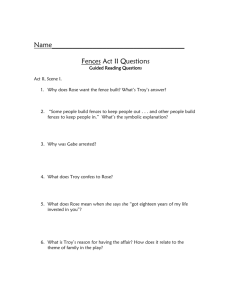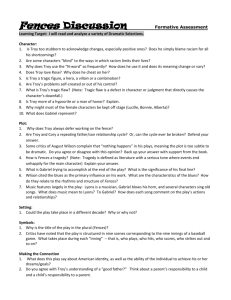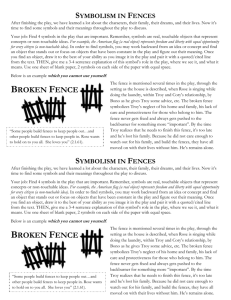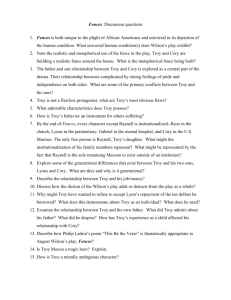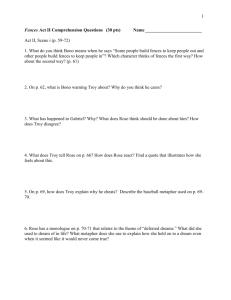Fences Unit
advertisement
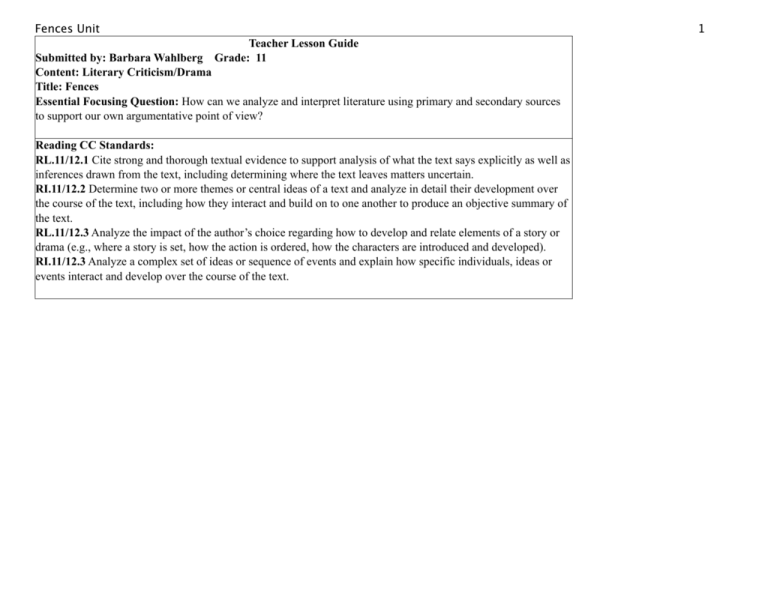
Fences Unit Teacher Lesson Guide Grade: 11 Submitted by: Barbara Wahlberg Content: Literary Criticism/Drama Title: Fences Essential Focusing Question: How can we analyze and interpret literature using primary and secondary sources to support our own argumentative point of view? Reading CC Standards: RL.11/12.1 Cite strong and thorough textual evidence to support analysis of what the text says explicitly as well as inferences drawn from the text, including determining where the text leaves matters uncertain. RI.11/12.2 Determine two or more themes or central ideas of a text and analyze in detail their development over the course of the text, including how they interact and build on to one another to produce an objective summary of the text. RL.11/12.3 Analyze the impact of the author’s choice regarding how to develop and relate elements of a story or drama (e.g., where a story is set, how the action is ordered, how the characters are introduced and developed). RI.11/12.3 Analyze a complex set of ideas or sequence of events and explain how specific individuals, ideas or events interact and develop over the course of the text. 1 Fences Unit Writing CC Standards: W.11/12.1 Write arguments to support claims in an analysis of substantive topics or texts, using valid reasoning and relevant and sufficient evidence. a. Introduce precise knowledgeable claim(s), establish the significance of the claim(s), distinguish the claim(s) from alternate or opposing claims, and create an organization that logically sequences claim(s), counterclaims, reasons, and evidence. b. Develop claim(s) and counterclaims fairly and thoroughly, supplying the most relevant evidence for each while pointing out the strengths and limitations of both in manner that anticipates the audience’s knowledge level and concerns, values, and possible biases. c. Use words, phrases, and clauses as well as varied syntax to link the major sections of the text, create cohesion, and clarify the relationships between claim(s) and reason, between reasons and evidence, and between claim(s) and counterclaims. d. Establish and maintain a formal style and objective tone while attending to the norms of conventions of the discipline in which they are writing. e. Provide a concluding statement or section that follows from and supports the argument presented. W.11/12.4 Produce clear and coherent writing in which the development, organization, and style are appropriate to task, purpose, and audience (Grade-specific expectations for writing types are defined in standards 103 above). W.11/12.5 Develop and strengthen writing as needed by planning, revising, editing, rewriting, or trying a new approach , focusing on addressing what is most significant for a specific purpose and audience. (Editing for conventions should demonstrate command of Language standards 1-3 up to and including grades 11-12). W.11/12.8 Gather relevant information from multiple authoritative print and digital sources, using advanced searches effectively; assess the strengths and limitations of each source in terms of task, purpose, and audience; integrate information into the text selectively to maintain the flow of ideas, avoiding plagiarism and overreliance on any one source and follow a standard format for citation. W.11/12.9 Draw evidence from literary or information texts to support analysis, reflection, and research. 2 Fences Unit Other CC Standards SL.11/12.1 Initiate and participate effectively in a range of collaborative discussions (one-onone, in groups, and teacher –led) with diverse partners on grades 11-12 topics, texts, and issues, building on others’ ideas and expressing their own clearly and persuasively. a. Come to discussions prepared, having read and researched material under study; explicitly draw on that preparation by referring to evidence from texts and other research on the topic or issue to stimulate a thoughtful, well-reasoned exchange of ideas. c. Propel conversations by posing and responding to questions that probe reasoning and evidence; ensure a hearing for a full range of positions on a topic or issue; clarify, verify, or challenge ideas and conclusions; and promoted divergent and creative perspectives. Respond thoughtfully to diverse perspectives; synthesize comments, claims, and evidence made on all sides of an issue; resolve contradictions when possible; and determine what additional information or research is required to deepen the investigation or complete the task. L.11/12.1 Demonstrate command of the conventions of standard English grammar and usage when writing or speaking. d. a. Apply the understanding that usage is a matter of convention, can change over time, and is sometimes contested. L.9/10.2 Demonstrate command of the conventions of standard English capitalization, punctuation, and spelling when writing. a. Observe hyphenation conventions b. Spell correctly. L.11/12.3 Apply knowledge of language to understand how language functions in different contexts, to make effective choices for meaning or style, and to comprehend more full when reading or listening. Focusing Essential Question: (This becomes the thesis of the essay (summative assessment). After reading the drama FENCES by August Wilson, how do the characters in the play construct fences around themselves and the people they love in order keep them safe and enclosed or try to keep others/something(s) out? Strategy suggestion/reminder Building Content Knowledge: What writing strategies do I need to teach? What types of strategies will be used to build reading skills? list 3 Fences Unit • vocabulary • • • • Close reading-using 2 critical texts (read out-loud for pleasure, read out loud again for content; read silently, reading for information with a partner, skimming for information) (there is a choice of 3 critical essays) Strategies: summarizing, paraphrasing, think-pair share, conversation Pulling significant/relevant quotes from both the literature and critical essays to support argument (essential question) Understanding of literary criticism • guided reading • text mapping • paraphrasing • summarizing • visualizing/ • imaging • dramatizing • oral processing / guided conversation / think-pairshare • experience • debating / Socratic seminar • taking notes (graphic organizers, T-charts, 2 column notes, etc.) Building Writing Knowledge: What writing strategies do I need to teach? What types of strategies will be used to build writing skills? • • • • • • Review structure of an essay using the student benchmarks and previous review of building an essay, using thesis, topic sentences Review how to incorporate evidence, including citing and paraphrasing Review topic sentences Review how to construct a viable conclusion Peer edit Teacher edit/conferencing • • • • • • Purpose: writing to a thesis Organization-Thesis building, body paragraph building, conclusion building Summarizing Details and Elaboration techniques Voice techniques Conventions - editing Organizational Structures: How will students know how to organize their ideas and construct the piece of writing? 4 Fences Unit • • Students will be able to use a graphic organizer to brainstorm ideas Students will be provided with a model for writing • teacher-written models • teacher-and-student written models • various types of templates or frames (or use of graphic organizer to brainstorm information) Writing/Revising: How will students draft / revise so that their final writing is clearly focused, organized, and developed to show understanding of the central ideas? • • • • • • • • Students will brainstorm and organize their ideas using graphic organizer Students will share their graphic organizer with others/the class Student will write a full piece of writing independently Students will share their writing with a partner for proofreading/revision using a guiding peer-edit sheet to aid students in their comments Students will be able to write a second draft which will be critiqued by teacher Student-teacher conference for papers, discussion Students will write a third revision based on teacher comments • • • • group write, fully or in parts - write section at a time write full piece independently • revise /share full group • revise /share partners • proofreading in partners Assessment: How are students doing, and how do I know? What will I use to assess? • Student pair/group guided discussions/sharing will be monitored and enhanced by interaction with teacher; • Sharing of graphic organizer as a class with add to students’ knowledge of supportive evidence • Student will begin writing assignment in class so teacher support is available. • Students will write a second revision that will be read and assessed by teacher, as well as critiqued for needed revision/guided instruction. Teacher will use the second revision as an assessment • The third revision will be assessed for improvement, as well as considered as an artifact for portfolio, assessed/scored according to district rubric. LESSON PLAN (Steps may be combined if there is enough time.) 5 Fences Unit Building content knowledge Step 1 • • • • Step 2 • • • • • Read the play FENCES: The play will be read out loud over the course of a few days, stopping at the end of each scene/break to make sure students understand the reading with probing questions, which will include an understanding of setting, conflict, point of view, and theme (close reading techniques). At the conclusion of reading the play, teacher will ask probing questions to make sure all of all students understood the content of the drama. Throughout the reading of the play, students will also have written work that will reinforce their understanding of the play. As a class, we will read two (choice of three) critical essays on FENCES that analyze the action, characters and main ideas of the play. These essays will be read at least five times over the course of the unit. We will discuss as a class. 1. Read each critical essay out loud once for listening/pleasure. 2. Read each critical essay out loud, students to follow along “armed” with a highlighter to underline relevant information based on the focusing question. 3. Read silently, using the same highlighting strategy as #2. 4. Students work with a partner, sharing what each underlined, and discussing why these quotes are relevant to the focusing question. 5. Skimming for information when filling out the graphic organizer. Students will be handed a graphic organizer divided into five sections (character, character’s traits, literary textual evidence that addresses the focusing essential question (thesis), secondary source textual evidence to support the focusing essential question, and students’ explanation of how these quotes support the thesis. Students will fill these organizers on their own. They will be asked to come up with two quotes from the play, at least one quote from the supporting secondary source, and their own ideas/ analysis of the character based on the textual evidence. Students will get together in pairs to share information. Monitor their discussion by going around the room and helping them/guiding them in their learning where, and if, it is necessary. We will share some of students’ ideas as a class. 6 Fences Unit • Step 3 • • Step 4 • • • Step 5 • • Students will be given writing instructions on how to build a critical essay using the quotes/work they have completed in their graphic organizer. Students are to choose 3 of the 6 characters upon which to base their essay. As a class, we will review thesis statement, thesis paragraph, topic sentences, body paragraphs, concluding paragraphs. Students will use class time to write their essays. Those who need extra time can take their essays home to complete (two or three class periods). We will agree on a completion time, at which time students will peer-edit. Students will either revise their papers according to the peer-edit for a second draft, or hand in to teacher who will read with a critical/editorial eye for revision. Teacher conference with students about revisions necessary for the third draft. Students will complete a third and final draft of their paper for grading, and for scoring as a portfolio assignment. The final paper will be eligible for inclusion in their RIEPS portfolio. Building Writing Knowledge Step 6 Once student have completed reading FENCES, they will be called upon to write a “mini-research paper” using both primary text and secondary literary criticism to support their claims about the play. Step 7 We will review as a class the following (reinforce): • building a thesis statement, which will be based upon what critical theory they choose to explore, • building an introductory paragraph with their thesis, • building supporting body paragraphs (which will include topic sentences), • how to cite both primary and secondary sources, • use of punctuation regarding citations; • building a concluding paragraph. Step 8 Students will learn how to pull primary source evidence from their reading to support some of their claims based on the focusing essential question. Step 9 Students will learn how to pull secondary source evidence from their reading of two critical essays on Wilson that help to support their stance. Step 10 Students will learn how to build their own critical essay based on their argument, incorporating the supporting evidence to build on their analysis. Step 11 Students will write a first draft that they will peer-edit using a check-list to make sure they have adequately written their essay. This check-list will be submitted with their second draft. 7 Fences Unit Step 12 Students will revise their first draft and hand in to the teacher with their first draft and check-list/peer-edit sheet. Step 13 Teacher will edit/provide comments for revision and return to students after a oneon-one writing conference. Step 12 Students will revise their essays based on the student-teacher conference and editorial comments and hand in for a final grade. 8 Fences Unit ADDENDUM #1 (GRAPHIC ORGANIZER) CHARACTER TROY ROSE CHARACTER TRAITS 2 LITERARY QUOTES 1 SECONDARY QUOTE YOUR ORIGINAL ANALYSIS 9 Fences Unit CORY LYONS BONO GABE 10 Fences Unit RAYNELL 11 Fences Unit 12 ADDENDUM #2 Title: An essay on Fences Author(s): Sheri Metzger Source: Drama for Students. Detroit: Gale. From Literature Resource Center. Document Type: Critical essay Full Text: [Metzger is a professional writer with a specialty in drama. In this essay she discusses Wilson's metaphoric use of baseball in portraying the life of his lead character, Troy Maxson.] The most prevalent image in August Wilson's Fences is baseball. It is the sport that defines Troy Maxson's life and provides the measure of his success. Indeed, Wilson has constructed the play into nine scenes—or innings—to emphasize the connection. According to Christine Birdwell in Aethlon, the innings correspond to the seasons of Troy's life. In some innings Troy is the hero who wins for his team, his family. These are the innings defined by Troy's success: his early success as a great hitter for the Negro Leagues, his protest at work that wins him a promotion to driver, and his noble, responsible efforts to provide for his family. But some innings are losses for Troy (and his team): his misunderstandings and painful confrontations with his two sons, his institutionalizing of his brother Gabriel, his broken relationships with Rose and Bono, and the death of Alberta. In the ninth inning, when Troy is dead, his family gathers in the yard to remember Troy's wins and losses. Birdwell noted that Wilson does not provide much information about the black baseball leagues in his play. The role baseball plays in framing Troy's strengths and weaknesses is more important than the history of the game itself. Instead the emphasis is on characterization. The audience learns that Troy was a good hitter and that his home run average far exceeded those of many white players. Nevertheless, the Negro League was not a source of viable income for its players; Troy could not have bought his home without the additional money from Gabriel's disability checks. In one of his complaints about the color line in baseball, Troy observes that he “saw Josh Gibson's daughter yesterday. She was walking around with raggedy shoes on her feet.” He then compares Gibson's child to the child of a white major league player, and declares “I bet you Selkirk's daughter ain't walking around with raggedy shoes on her feet.” The reference is clear: Negro League players cannot make enough money to support their families. The injustice rankles Troy whose bitterness at the slight baseball has shown him is evident throughout the play. Fences Unit 13 Besides his thirty-year friendship with Bono, the fifteen years that he spent in prison provided Troy with another benefit. It demonstrated to him that he had a talent, one that set him apart from other men, one that proved his worth. But, as Birdwell noted, baseball also proved a disappointment. For Troy, “the triumphs of the past have become bitter betrayals, and baseball now means lost dreams. Baseball had defined Troy, had given him meaning and status; now it has left him with nothing tangible.” Troy is so angry over his own lost opportunities that, by 1957, he cannot take pleasure in the fact that black men are finally able to play major league ball. Integration means nothing to him because it came too late to benefit his life. He complains that “if you could play ball then they ought to have let you play.” Ability and not color should determine who plays baseball, but Troy recognizes that justice has been missing for black men. When he tries to explain his distrust of the white sport establishment to Cory, Troy observes that “the colored guy got to be twice as good [as the white player] before he get on the team.” He also notes that although the leagues are now integrated, the black players sit on the bench and are not used. Cory has no personal experience that corresponds to his father's. He has been playing football in high school and recruiters want him to play in college; he fails to see any lack of opportunity. Each man feels the other is blind to the truth, but both are centered in their own experience. In a real sense, Troy has become blind to the changes of the past ten years, and it is this ignorance that provokes him to deny Cory's chance at succeeding. Too often, fathers use sons to achieve the success they feel they have been denied. But Troy has no desire to live vicariously through his son. Finally, in the eighth inning/scene, their opposing positions result in a confrontation that turns violent. After having been told by his father that he is earning strikes, Cory grabs a baseball bat and advances with the intent of swinging at his father. This is the strike-out about which Troy has been warning his son. Cory swings twice and misses, but Troy is stronger and seizes the bat, denying his son the third swing that may have resulted in a strike-out—or a hit. Birdwell observed that in this scene, “Wilson presents a reverse image of the traditional, treasured father-and-son backyard game depicted in films and on television. Instead father and son vie for the bat transformed into a weapon, and savage combat erupts.” Baseball should provide fathers and sons with a bonding experience, with an opportunity for playful competition. But Cory cannot compete with Troy. Troy's need for control, a pattern he learned from his own brutal father, is too ingrained for him to soften his ways. Although he means the best for Cory, Troy's misdirected efforts result in the loss of his son. He will die without having ever seen Cory again. The relationship that Troy forges with his wife, Rose, also proves to be limited by his experience in baseball. After eighteen years of marriage, Troy feels he needs to escape the confining walls of responsibility through an affair with another woman. The other woman, Alberta, is Troy's attempt to capture what has been lost, his youth. If Troy is now too old to play major league baseball, he is not too old to be attractive to other women. Birdwell insisted that Alberta “returns Troy to baseball's yesteryears, Fences Unit in which, according to Bono, 'a lot of them old gals was after [him],' when he 'had the pick of the litter.'” 14 While Troy might see another woman as a way to escape into the past, there is less opportunity for Rose to escape the pressures and responsibilities of life. The role women play in Fences is limited by the time period in which the play is set. In the 1950s, women were restrained by traditional roles and the division of private and public spheres. Men functioned in the public sphere; they left the home to go to jobs. In contrast, women primarily functioned in the private sphere of home and domestic chores. When Rose is confronted with Troy's infidelity, she may choose to remain in the marriage, but that choice does not signify that she is accepting or helpless. During her marriage, Rose has allowed Troy to fill her life. She tells Troy, “I took all my feelings, my wants and needs, my dreams ... and I buried them inside you.” But Troy's betrayal forces Rose to reassess her position, according to Harry Elam in May All Your Fences Have Gates. This reassessment, noted Elam, means new avenues of freedom that “affirm rather than assault traditional gender limitations.” Rose substitutes her church for her husband. When, at the end of the seventh inning/scene, Rose tells Troy that “this child got a mother. But you a womanless man,” she is asserting her independence from her husband. Elam quoted Patricia Collins's argument that black women learn independence at church, but they also learn to subordinate their interests to the greater good of the African American community. Rose has chosen to take the subservient role in marriage. She admits her complicity, but the audience is reminded that her options were few. Yet she is not an oppressed woman, and when Rose takes the infant Raynell and speaks the lines that end this scene, Elam noted that “the audience, particularly black female spectators, erupted with cheers and applause.” Clearly, Rose is perceived by black women as a strong female character and not an oppressed figure. As Sandra Shannon noted in an essay in May All Your Fences Have Gates, Rose “evolves from a long-suffering heroine to a fiercely independent woman.” This evolution is what audiences are cheering. With Fences, Wilson created a play that explores the barriers that confine blacks. The title serves as a metaphor for all the fences that imprison the Maxsons. The fence that surrounds the Maxson home is not the white picket fence of the 1950s American ideal. Their fence is not decor and it is not an enhancement—its purpose is strictly utilitarian. At the beginning of the play, Troy thinks he is building a fence to please Rose. She wants a fence that will keep all those she loves safe inside its walls. Later, after Alberta's death, Troy completes the fence to keep danger, death, outside its walls. For most of the play's action, though, Troy is in no hurry to complete Rose's fence, after all, he has spent time in prison with fences limiting his movements. And when he played baseball, he was never content to just hit a home run into the stands; he felt that he had to transcend the boundaries of the stadium and hit a ball over the fence. For Troy, fences have been a restriction, and he's in no hurry to build another. Yet there are many fences that lie in Troy's way that he cannot control or hit a ball over. The Fences Unit 15 mental hospital where Troy confines Gabriel provides one such fence, while another kind of fence—one between the living and the dead—is erected when Alberta dies. It is this latter enclosure that finally creates a sense of urgency in Troy. The fence Troy completes, however, will fail to keep Cory inside. Although Troy has attempted to confine Cory within his authority, his son does escape. Yet when he returns, the audience learns that Cory is now bound within the confines of a far more strict institution, the military. Cory has escaped from his father's authority only to end up bound in the rule of the Marine Corps. With the Vietnam War looming only a few years away, the boundary created by the military is an especially dangerous one for black males. The fences that would keep Cory from reaching his goals is not unlike the fences that limit Rose. In the last scenes of the play when Rose finally asserts herself, she is really only exchanging Troy's fence for the one offered by the church. Religion provides its own fences and limitations, and for Rose, who chooses not to break free of the institution of marriage, the church offers a haven within its institutionalized walls. Even Gabriel who is allowed a temporary escape from the mental hospital, ends the play with an effort to create an opening in the fence so that Troy might enter heaven. But for blacks, the most difficult fence to scale, the one that restricts their achievements, the one that steals opportunities, is the fence that whites erect to keep blacks in a place away from mainstream success. This is the fence that Wilson wants his audience to see. This is the fence against which blacks are forced to struggle. In an interview that appeared in In Their Own Words: Contemporary American Playwrights, Wilson said that by the end of Fences, every character had been institutionalized, except Raynell; she is the hope of the future. Raynell stands within the confines of the fence that surrounds the yard, but the audience leaves with the perception that she will go beyond that barrier to achieve a better future than her father. Source Citation (MLA 7th Edition) Metzger, Sheri. "An essay on Fences." Drama for Students. Detroit: Gale. Literature Resource Center. Web. 19 June 2014. Document URL http://go.galegroup.com/ps/i.do?id=GALE %7CH1420002765&v=2.1&u=cran90891&it=r&p=LitRC&sw=w&asid=c13d3badde7260f3e265754f33c7df80 Fences Unit 16 ADDENDUM #3 Title: Fertile ground: August Wilson's 'Fences' Author(s): Mollie Wilson O'Reilly Source: Commonweal. 137.11 (June 4, 2010): p20. From Literature Resource Center. Document Type: Critical essay Bookmark: Bookmark this Document Copyright: COPYRIGHT 2010 Commonweal Foundation Commonweal@msn.com Full Text: August Wilson touched off a vigorous debate in the theater world when he declared, in 1996, that "colorblind casting is an aberrant idea" and a tool of "cultural imperialism." Wilson, one of postwar America's most significant playwrights, was addressing the national conference of the nonprofit organization Theatre Communications Group (where I once worked). His forceful speech (later published as The Ground on Which I Stand) got people arguing about race in the theater, and especially the practice of casting black actors in roles written for whites. "Colorblind" is an unhelpfully reductive term for a complicated reality. There are valid distinctions to be made between, say, a mixed-race Shakespeare company and--to cite Wilson's main example--"an all-black production of Death of a Salesman." For Wilson, the issue was about more than actors; the critical question was whose stories are deemed worthy. He bristled at the suggestion that African-American artists like himself should aspire to the standards of white European culture, as though acknowledging the full humanity of black Americans required erasing their history. "We can meet on the common ground of theater as a field of work and endeavor," he told his colleagues. "But we cannot meet on the common ground of experience." Wilson spent his life making sure black actors and audiences would find their history respected and reflected in American theater. When he died in 2005, he had just completed the final installment of his ten-play cycle tracing African-Americans' journey "from the hull of a ship to self-determining, self-respecting people." In each play, Wilson wrote about black Americans "reassembling" themselves and their communities and coping with discrimination and poverty in another decade of the Fences Unit twentieth century. (The plays have been published as a set from TCG, The August Wilson Century Cycle.) 17 Such an ambitious goal might have yielded drearily didactic historical drama, but Wilson's plays are immensely entertaining, with a compelling cast of characters and lyrical, expressive dialogue. All but one of the plays are set in the Hill Section of Pittsburgh, where Wilson was raised. Some names and characters recur across the decades. Most of the action unfolds in spaces where families and neighbors gather to talk: a backyard, a coffee shop, a dining room. The plot's progress is generally disguised in a free-flowing stream of conversation, punctuated by masterfully crafted speeches, hilarious and profound. And woven through it all are the "truth-sayers"--characters whose grasp on reality seems tenuous, but whose spiritual vision is intense. They are a link to the "spirit world," which Wilson once explained is "the world that the characters turn to when they are most in need." The closest Wilson came to answering Death of a Salesman was Fences, a gripping domestic tragedy set in 1957. Fences won the 1987 Pulitzer Prize for drama (Wilson's first; he also won in 1990 for The Piano Lesson), and it is currently on Broadway in a splendid revival directed by Kenny Leon. It is the story of Troy Maxson, a garbage collector, former baseball player, and exconvict who has built a solid living from nothing, and who winds up destroying what he ought to value most in his attempt to assert his identity. Troy's life has been shaped by racial discrimination, economic injustice, and an abusive upbringing. He is limited as well by his personal faults, and like many of Wilson's characters, he has difficulty knowing where one source of trouble ends and the other begins. He faces questions that resonate throughout the Century Cycle: What is the proper balance between acceptance and outrage at injustice? When simply getting by is so difficult, how can a person focus on storing up treasure that can't be taken away? Troy prides himself on tending to his responsibilities: he owns a home, he provides for his wife and son, and he even wins a promotion after enlisting the help of his union. But the effort to define himself has left him emotionally barren and withholding. Resentment over having come along "too early" to build a career in baseball as a black man keeps Troy from acknowledging that conditions may be better for his son, who has a chance to go to college on a football scholarship: "There ought not never have been no time called too early!" he seethes. His son, smarting from Troy's rejection of his college aspirations, asks, "How come you ain't never liked me?" "What law is there say I got to like you?" Troy retorts. His betrayal of his wife, Rose, is still more devastating. Yet even as he informs her of his unfaithfulness, he insists, "I ain't sorry for nothing I done. It felt right in my heart." His frame of reference is as cramped as the batter's box he imagines himself standing in, alone, facing down death. As Troy, film star Denzel Washington puts his considerable Hollywood charm to use in bringing out the character's endearing qualities along with his flaws. He expertly locates the vulnerability beneath Troy's bravado. Viola Davis (Oscar-nominated for the 2008 film Doubt, and a veteran of several cycle plays) is a restrained but powerful presence as Rose. The fence around the yard that Troy is building throughout the play is Rose's idea--an expression of her desire to define and protect what she values. Fences Unit 18 She is a reconciler, determined to hold her family together; she stays on the margins of the men's conversation in the yard and changes the subject whenever she senses danger or discord. She looks out for the son from a previous marriage whom Troy neglects, and for Gabe, Troy's brother, brain-damaged in the war. Rose knows Troy's faults better than he does, and when she finally explodes in anger, the scene is heartrending: "You take," she tells him, "and don't even know nobody's giving!" In print, Fences carries an epigraph from the playwright: "When the sins of our fathers visit us/We do not have to play host./We can banish them with forgiveness/As God, in His Largeness and Laws." Troy wrestles with his father's legacy, and his family in turn struggles with the fallout from his mistakes. Wilson's verse suggests that forgiveness is the key to moving forward as individuals and in community. The clearest illustration of that possibility (a major theme in the cycle) is Rose's willingness to accept Troy's illegitimate baby as her own, an act of generosity that looks toward the future, determined to make a blessing out of pain. Like so many of Wilson's characters, Rose finds her strength in religion; she turns to the church when her marriage lets her down. But the prophet of Fences is Troy's disabled brother, who "believes with every fiber of his being that he is the Archangel Gabriel." Gabe predicts that Troy's story will end in glory--"St. Peter got your name in the book," he insists. "I seen it." And Gabe's advocacy bears fruit in the play's final moments, when--according to the stage directions, beautifully interpreted here--"the gates of heaven stand open as wide as God's closet." Wilson died of liver cancer at sixty. His last play was Radio Golf, set in 1997, by which time Aunt Ester is long dead, and her descendants are fighting to save her home from being demolished. This conclusion to the cycle is a final warning from Wilson about the cost of forgetting or abandoning one's history. Thanks to his efforts and gifts, that history has a strong and lasting voice in American theater. Fences alone secures Wilson's legacy, and the production now on Broadway is a worthy tribute. Mollie Wilson O'Reilly is an associate editor of Commonweal. O'Reilly, Mollie Wilson Source Citation (MLA 7th Edition) O'Reilly, Mollie Wilson. "Fertile ground: August Wilson's 'Fences'." Commonweal 137.11 (2010): 20+. Literature Resource Center. Web. 19 June 2014. Fences Unit 19 ADDENDUM #4 Title: August Wilson: A New Approach to Black Drama Author(s): Yvonne Shafer Publication Details: Zeitschrift Für Anglistik und Amerikanistik 39.1 (1991): p17-27. Source: Drama Criticism. Vol. 31. Detroit: Gale. From Literature Resource Center. Document Type: Critical essay In Fences Wilson is dealing with the polarities of loving and dying. In Beyond the Pleasure Principal Freud noted Eros and the death wish as the elementary powers whose counterpoint governs all the puzzles of life. Wilson establishes these two forces as governing factors in the life of the protagonist. Fences deals with the failed dreams of Troy Maxon, a black ball player who played in the minority black leagues, but was barred from the major (all white) leagues because of his race. Wilson wrote the play to show the indignities which blacks in that generation suffered, but hid from their children.26 Set in the 1950's, the play presents conflicts familiar to blacks in the audience--indeed, one critic wrote that he was moved to tears because he seemed to see his own life on stage.27 The central metaphor in the play is that of fences: fences between the races, fences to keep people out, fences to keep people in, futile attempts at fencing in life. Troy Maxon, a former ball player is literally building a fence around his house to please his wife Rose, although he sees no use for it. Unable to fence in Troy's love, Rose is crushed when he informs her that he has another woman and is expecting a child. When the woman dies in childbirth, Troy challenges Mr. Death, and says he will fence in the yard so he can't sneak up on him again,28 from play. In the following scene he enters the yard carrying the child which he askes Rose to take care of. She agrees, but tells him that he is now "womanless." Juxtaposed with the threat of death is the attempt to find life, and some meaning in life through sex. Troy's life has been blighted, and in a speech he describes an existence familiar to both blacks and whites, Fences Unit 20 I come in here every Friday. I carry a sack of potatoes and a bucket of lard. You all line up at the door with your hands out. I give you the lint from my pockets. I give you my sweat and my blood. I ain't got no tears. I done spent them. We go upstairs to that room at night and I fall down on you and try to blast a hole into forever. I get up Monday morning ... find my lunch on the table. I go out. Make my way, find my strength to carry me through to the next Friday. That's all I got to give. I can't give nothing else.29 Another major motif is the relationship between fathers and sons. Although Troy criticizes his own father, he gives him credit for raising him and feeding him. When Troy criticizes his grown son by a previous marriage, the son responds, "If you wanted to change me, you should have been there when I was growing up."30 With his son by Rose, Troy is hard and demanding, and in a strong scene between the two, grills him about his housing, his food, and his clothing, concluding, "I done give you everything I had to give you, I gave you your life. ... And liking your black ass wasn't part of the bargain."31 Early in the play, he tells his son Cory that he is in the batter's box and has one strike (i. e. of the three strikes which mean a batter is out). Finally, Troy says Cory has struck out, and following an intense confrontation in which both men are driven to beat the other with a baseball bat, Troy ejects his son from his home. In the final scene of the play, Cory returns for Troy's funeral after seven years in the marines. He is bitter about his youth and about the fact that Troy kept him from going to college as a football player. However he is touched by the presence of Raynell, the sweet love child brought up by Rose. And as he and Raynell sing Troy's old song about a dog named Blue, the family gathers, and there is a reconciliation within the several generations and branches of the family. The play ends with a climactic event as Troy's deranged brother Gabriel, first attempts to blow his horn so that Troy can get into heaven, then does a "slow, strange dance, eerie and life-giving. A dance of atavistic signature and ritual." As he finishes his dance the stage is diffused with light as "the gates of heaven stand open as wide as God's closet" and Gabriel states with satisfaction, "That's the way that go!"32 Fences is Wilson's most successful play to date. It broke the record for non-musical plays by grossing $11 million during the first year in New York. First presented at the Yale Repertory, the play subsequently moved to Broadway where it was hailed by the critics as an outstanding play. Howard Kissel wrote, "Wilson is one of the few American playwrights you can call a poet. His characters are simple but deeply felt, and his language enobles their troubling lives."33 William A. Henry III said, "Wilson's greatest gift is his ability to make sense of anger: he writes naturalistic scenes of genial humor turning into an explosive violence that flows from his characters and from the warping effect racism has had upon them."34 In his review entitled "Fiery Fences", Clive Barnes stated, "It is the strongest, most passionate American dramatic writing since Tennessee Williams."35 Several critics commented on Wilson's ability to depict the black American experience but extend the field of interest beyond that specific area. Edwin Wilson remarked, Fences Unit 21 Another impressive quality of Mr. Wilson's play is that it is not a polemical piece. Because the play is set in the late '50s, just before the civil-rights movement exploded, racial discrimination is very much a part of the fabric of the play, affecting the situation of every character. As important as it is, however, that is not the main focus. Rather it is the universal quality of the people.36 Fences subsequently won the Pulitzer Prize for the best play of the year and the New York Drama Critics Circle Award. It won four Tony awards (Antoinette Perry Awards) including best play, best direction of a play (Lloyd Richards), best performance by an actor in a play (James Earl Jones), and best performance by a featured actress in a play (Mary Alice). Despite his aversion to television and films, Wilson has written the screenplay for Fences which will star the superb actor James Earl Jones, for whom he wrote the role of Troy. Source Citation (MLA 7th Edition) Shafer, Yvonne. "August Wilson: A New Approach to Black Drama." Zeitschrift Für Anglistik und Amerikanistik 39.1 (1991): 17-27. Rpt. in Drama Criticism. Vol. 31. Detroit: Gale, 2008. Literature Resource Center. Web. 19 June 2014.

